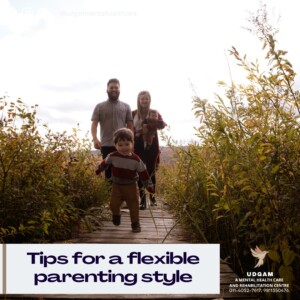Tips for a Flexible Parenting Style
Reading books or going online for more and more tips on how to help your children is a common occurrence with most parents. We approach parenting just like we prepare for any other subject. Want to try a new recipe, research it, or get into a new hobby, research it. Research is a method to approach something new.
But parenting is not, the same as any other role or hobby. It is not only a greater commitment, but it is not the same for everyone. The parent, the child, the environment, the opportunity and the capacities are different for everyone. Even children of the same parents do not have the same childhood, or parents of more than one kid, do not have the same parenting experience either.
So then what should we do?
The answer is simple, learn as you grow and most importantly keep a few tips in your mind.
- Practice Empathy: we believe that since we have been through the same age, we understand our child's situation very well. But if we keep the above sentence in mind, we haven't lived their childhood through their eyes. And as such we do not know what they suffer from. To practise empathy we must try to put ourselves in our child’s place, to see how they would have understood the situation and why they feel justified in their behaviour. And then using this knowledge, we can try to reason with them and make them understand the situation.

- Behave the Expected Behaviour: sounds cliche, you might have read it in multiple places, but do practise what you preach. Kids learn more from observations than from instructions. It does mean that you cannot expect them to leave their gadgets only after a half-hour of play when they see you on them for hours, the fact that you are working and they are not sounds useless to them. Rules made by words work, only in letting children know what is expected, but showing them what is expected is much more efficient. So put your gadgets away, so that your child will. Have a hobby so that your child will. Care more for others, or lie less, if that is what you want to teach your children.
- Cultivate Cause-Effect Mentality: not to sound negative but parents coddle their children too much so that our children live in an entirely different world than what they observe while growing up. It is good because in a safe environment the child grows up to have stronger bonds, but the demerit of it is that there is a disconnect when a child is asked to deal with the adult world. Tell children that every choice they make has consequences, good, bad or just meh. These choices are their responsibilities, but the burden of consequences is also theirs. If they choose to eat ice cream before dinner, it's okay- the consequence of a stomach ache or no tv time is theirs to bear.
- Unlearn that Discipline Equals punishment: discipline is the foundation of parenting. Not to be confused with punishment, as a discipline exists to help the child do better than what they are currently doing. It is a lifelong process. Punishing a child when they have misbehaved in hopes that they would not repeat such behaviour is not a foolproof method. Children understand that punishment is temporary, and feel guilty only for that moment. So instead of relying on physical punishments, teach them at that moment why what they did was wrong, ask them to reflect on it and then ask what they think about the situation.
- Build self-Reliance: the confidence to experiment with something new comes from being exposed to mistakes. Instead of covering up your child’s mistakes, help them realise what they have done. Start with something as simple as cleaning the table if they have spilt something. Children probably will not clean well if they are young, but it is giving them that responsibility which makes the difference. Ask them to fold and put their clothes away, even if you have to do it again after them. While making them do these activities you are building up their self-reliance so that in future they are more confident in approaching new tasks.
- Cultivate Intellectual Curiosity: do not tell them to stop asking questions. Instead direct them to a better source of information, if you aren't one. Them having this nature of wanting to learn more, and you facilitating their growth, can help them go a long way.
- Express Emotions: cultivate independent thought, but also do not restrain emotional expression. For a small child, you may find managing their emotions very hard, because they are unpredictable. But good expression helps your child grow up more open and stable with their feelings.
The most important tip of all is to be consistent with your rules and advice. Do not make rules without proper reasons, and explain them to your children. If you keep consistent, children will believe your words more. This builds trust and a sense of safe space when there is open communication in the family.
Do not be too hard on yourself as a parent. You are growing along with your child, you make mistakes and you learn from them. Give yourself room to grow as a parent and as an individual. Stay tuned to our website to learn more about parenting.
[ratings]
Anuja Sathe
Counselling Psychologist



